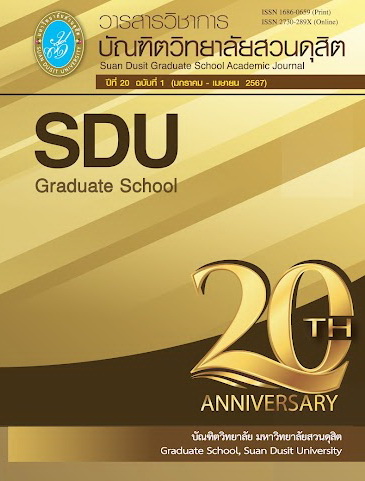ปัจจัยที่มีผลต่อความสำเร็จในการถ่ายทอดความรู้ด้านเครื่องมือดิจิทัล กรณีศึกษาบริษัทปิโตรเคมีแห่งหนึ่งในประเทศไทย
คำสำคัญ:
ปัจจัยที่ส่งผล, การถ่ายทอดความรู้, เครื่องมือดิจิทัล, การวิเคราะห์องค์ประกอบเชิงสำรวจบทคัดย่อ
งานวิจัยนี้เป็นงานวิจัยเชิงปริมาณ มีวัตถุประสงค์เพื่อศึกษาองค์ประกอบของปัจจัยที่มีผลต่อความสำเร็จในการถ่ายทอดความรู้ เพื่อนำไปยกระดับสมรรถนะการประยุกต์ใช้เครื่องมือดิจิทัลสำหรับกลุ่มพนักงานที่ไม่ใช่สายตรงดิจิทัล และเพื่อเสนอแนะแนวทางในการพัฒนากลยุทธ์การถ่ายทอดความรู้ด้านดิจิทัลในองค์กร โดยใช้กลุ่มตัวอย่างของบริษัทปิโตรเคมีแห่งหนึ่งในประเทศไทยจำนวน 442 ตัวอย่าง และสุ่มตัวอย่างด้วยวิธีแบบเฉพาะเจาะจงผ่านการเก็บข้อมูลด้วยแบบสอบถามออนไลน์ที่มีลักษณะคำถามปลายปิด และทดสอบความเที่ยงตรงเชิงเนื้อหา และความน่าเชื่อถือของแบบสอบถาม ทั้งนี้ วิเคราะห์ข้อมูลด้วยเทคนิคการวิเคราะห์องค์ประกอบเชิงสำรวจ เพื่อกำหนดองค์ประกอบร่วม และจัดกลุ่มองค์ประกอบใหม่ ผลการวิจัย พบว่า ปัจจัยที่มีผลต่อความสำเร็จในการถ่ายทอดความรู้ ประกอบด้วย 5 ปัจจัย ได้แก่ 1) ปัจจัยด้านผู้ถ่ายทอด 2) ปัจจัยด้านผู้รับการถ่ายทอด ที่มีระดับความรู้ ประสบการณ์ด้านดิจิทัล ระดับความสามารถในการดูดซับ และความตั้งใจในการเรียนรู้ 3) ปัจจัยด้านคุณลักษณะเทคโนโลยี 4) ปัจจัยด้านกระบวนการถ่ายทอด และ 5) ปัจจัยวัฒนธรรมด้านดิจิทัล และแนวทางในการพัฒนาคือ องค์กรควรกำหนดกลยุทธ์ให้ครบ 5 ด้านที่มุ่งเน้นพัฒนาทักษะการถ่ายทอดของผู้ถ่ายทอด การสร้างแรงจูงใจกับผู้รับการถ่ายทอดในการนำดิจิทัลไปประยุกต์ใช้ การจัดสรรเครื่องมือดิจิทัลให้มีความเหมาะสมและง่ายต่อการใช้งาน การพัฒนากระบวนการถ่ายทอดให้มีเนื้อหาที่เข้าใจง่ายและมุ่งเน้นการฝึกปฏิบัติ และการสนับสนุนขององค์กรอย่างต่อเนื่องทั้งด้านทรัพยากร ด้านผู้บริหารและด้านการสื่อสาร
เอกสารอ้างอิง
สุรพงษ์ คงสัตย์ และธีรชาติ ธรรมวงค์. (2558). การหาค่าความเที่ยงตรงของแบบสอบถาม (IOC). มหาวิทยาลัยมหาจุฬาลงกรณราชวิทยาลัย. สืบค้นเมื่อ 25 ตุลาคม 2565 จาก https://www.mcu.ac.th/article/detail/14329.
อรพรรณ คงมาลัย และอัญณิฐา ดิษฐานนท์. (2562). เทคนิควิจัยด้านการบริหารเทคโนโลยีและนวัตกรรม (พิมพ์ครั้งที่ 1). กรุงเทพฯ: มหาวิทยาลัยธรรมศาสตร์.
อรรถไกร พันธุ์ภักดี. (2559). การเปรียบเทียบผลการใช้สถิติวิเคราะห์ข้อมูลเพื่อตรวจสอบความตรงเชิงโครงสร้างของแบบวัดทุนทางสังคมระหว่างการวิเคราะห์องค์ประกอบเชิงสำรวจกับการวิเคราะห์องค์ประกอบเชิงยืนยัน. วารสารบริหารธุรกิจเศรษฐศาสตร์และการสื่อสาร, 11(2), 46-61.
Bjorvatn, T., & Wald, A. (2018). Project Complexity and Team-level Absorptive Capacity as Drivers of Project Management Performance. International Journal of Project Management, 36(2018), 876-888.
Bacon, E., Williams, M. D., & Davies, G. (2020). Coopetition in Innovation Ecosystems: A comparative Analysis of Knowledge Transfer Configurations. Journal of Business Research, 115(2020), 307-316.
Daugherty, P., Ghosh, B., Rippert, A., Venkataraman, R. and H. J., Wilson. (2021). Scaling Enterprise Digital Transformation. Retrieved on October 10, 2022 from https://www.accenture.com/us-en/insights/technology/scaling-enterprise-digital-transformation.
Field, A. (2017). Discovering Statistics Using IBM SPSS Statistics. (5 ed.). London: SAGE Edge.
Glaser, M., Blake, O., Bertolini, L., Te Brömmelstroet, M., & Rubin, O. (2021). Learning from Abroad: An Interdisciplinary Exploration of Knowledge Transfer in the Transport Domain. Research in Transportation Business & Management, 39(2021), 100531.
Gurumurthy, R., Nanda R. & Schatsky, D. (2022). Putting Digital at the Heart of Strategy. Retrieved on October 10, 2022 from https://www2.deloitte.com/us/en/insights/topics/digital-transformation/digital-acceleration-in-a-changing-world.html.
Hair, J. F., Balck, W. C., Babin, B. J., & Anderson, R. E. (2010). Multivariate Data Analysis: A Global Perspective. (7thed.). New York: Pearson.
Hamalainen, R., Nissinen, K., Mannonen, J., Lamsa, J., PhD, Leino, K., & Taajamo, M. (2021). Understanding Teaching Professionals’ Digital Competence: What do PIAAC and TALIS Reveal About Technology-related Skills, Attitudes, and Knowledge?. Computers in Human Behavior, 117(2021), 106672.
Hamid, N.A.A., & Salim, J. (2011). A Conceptual Framework of Knowledge Transfer in Malaysia E Government IT Outsourcing: An Integration with Transactive Memory System (TMS). International Journal of Computer Science Issues, 8(5), 51-64.
Ifenthaler, D., & Egloffstein, M. (2019). Development and Implementation of a Maturity Model of Digital Transformation. Association for Educational Communications & Technology 2019, TechTrends, 64, 302–309.
Karlsen, J. T., & Gottschalk, P. (2015). Factors Affecting Knowledge Transfer in IT Projects. Engineering Management Journal, 16(1), 3-11.
Khongmalai, O., & Distanont, A. (2022). Influence of Knowledge Transfer Model on IT Outsourcing Performance: An Empirical Evidence of Thai Banking Industry. Kasetsart Applied Business Journal, 16(24), 73–92.
Kumar, J.A., & Ganesh, L. (2009). Research on Knowledge Transfer in Organizations: A Morphology. Journal of Knowledge Management, 13(4), 161-174.
Liyanage, C., Elhag, T., Ballal, T., & Li, Q. (2009). Knowledge Communication and Translation-a Knowledge Transfer Model. Journal of Knowledge management, 13(3), 118-131.
Lockett, N., Kerr, R., & Robinson, S. (2008). Multiple Perspectives on the Challenges for Knowledge Transfer Between Higher Education Institutions and Industry. International Small Business Journal: Researching Entrepreneurship, 26(6), 661-681.
Nyikes, Z. (2018). Contemporary Digital Competency Review. Interdisciplinary Description of Complex Systems, 16(1), 124-131.
Nunnally, J. C. (1978). Psychometric Theory (2nded.). New York: McGraw-Hill.
Porrawatpreyakorn, N., Quirchmayr, G., & Chutimaskul, W. (2009). Requirements for a Knowledge Transfer Framework in the Field of Software Development Process Management for Executive Information Systems in the Telecommunications Industry. Paper Presented at the International Conference on Advances in Information Technology. Conference’10, Month 1–2, 2010.
Ren, X., Yan, Z., Wang, Z., & He, J. (2019). Inter-project knowledge Transfer in Project-based Organizations: an Organizational Context Perspective. Management Decision, 58(5), 844-863.
Rossmann, A. (2018). Digital Maturity: Conceptualization and Measurement Model. Thirty Ninth International Conference on Information Systems. 13-16 December 2018, vol. 2. San Francisco, California; USA.
Srisuksa N., Wiriyapinit M., & Bhattarakosol P. (2021). Factors Affecting Knowledge Transfer Between Project Managers: A Conceptual Framework. 13th International Joint Conference on Knowledge Discovery. Knowledge Engineering and Knowledge Management IC3K 2021-Volume 3: KMIS. 25–27 October 2021 (211-218). Valletta: Malta.
Zarinpoush, F., & Gotlib Conn, L. (2006). Knowledge Transfer Tip Sheet Imagine Canad. Retrieved on October 12, 2022 from http://sectorsource.ca/sites/default/files/resources/files/tipsheet5_knowledge_transfer_en.pdf.
Zhao, Y., Hu, N., & Cao, J. (2021). Research on Entrepreneurial Competency Model Under the Background of Digital Economy. 14th International Symposium on Computational Intelligence and Design (ISCID), 11-12 December 2021 (186-191). Hangzhou: China.
ดาวน์โหลด
เผยแพร่แล้ว
รูปแบบการอ้างอิง
ฉบับ
ประเภทบทความ
สัญญาอนุญาต
ลิขสิทธิ์ (c) 2024 บัณฑิตวิทยาลัย มหาวิทยาลัยสวนดุสิต

อนุญาตภายใต้เงื่อนไข Creative Commons Attribution-NonCommercial-NoDerivatives 4.0 International License.






